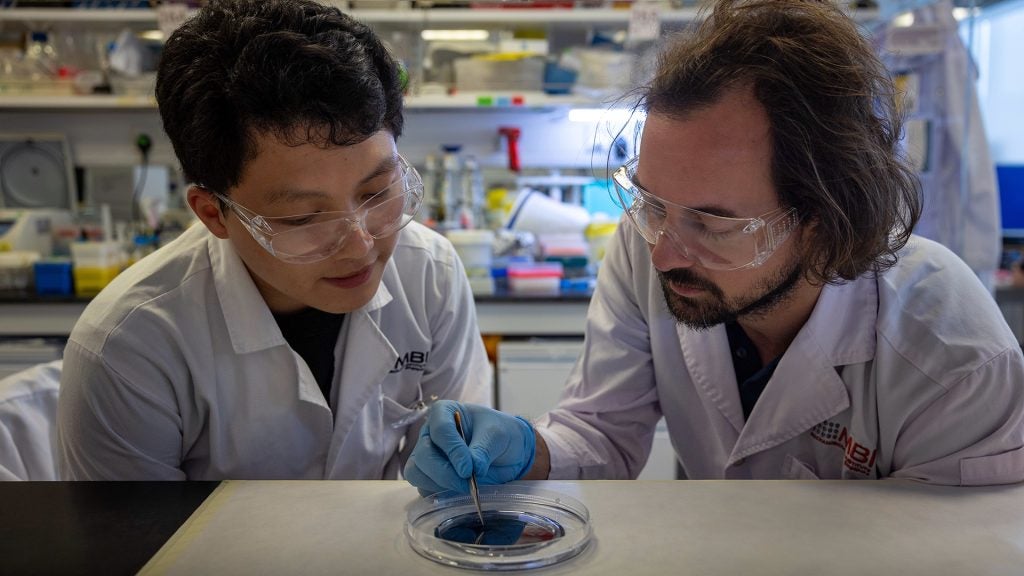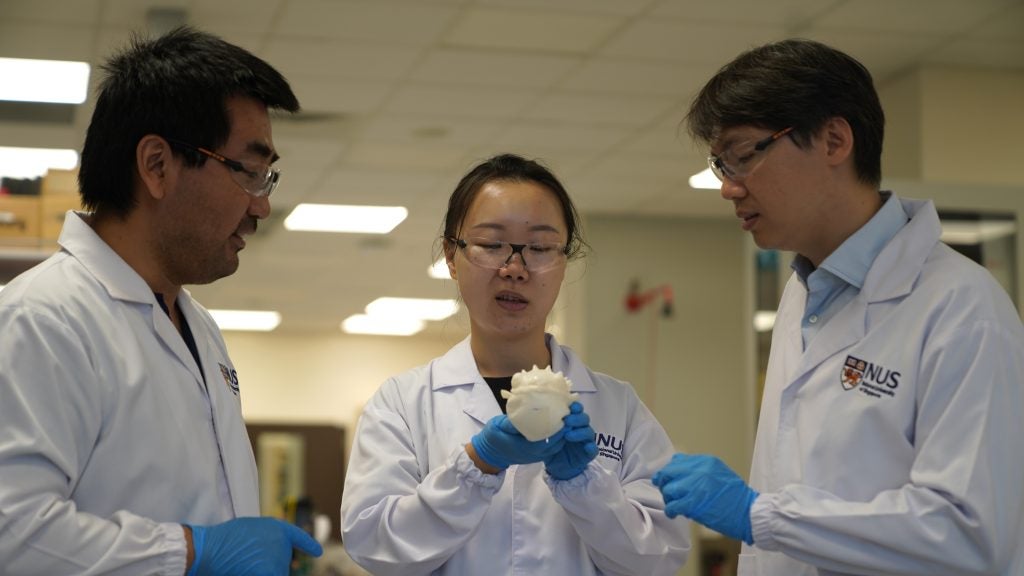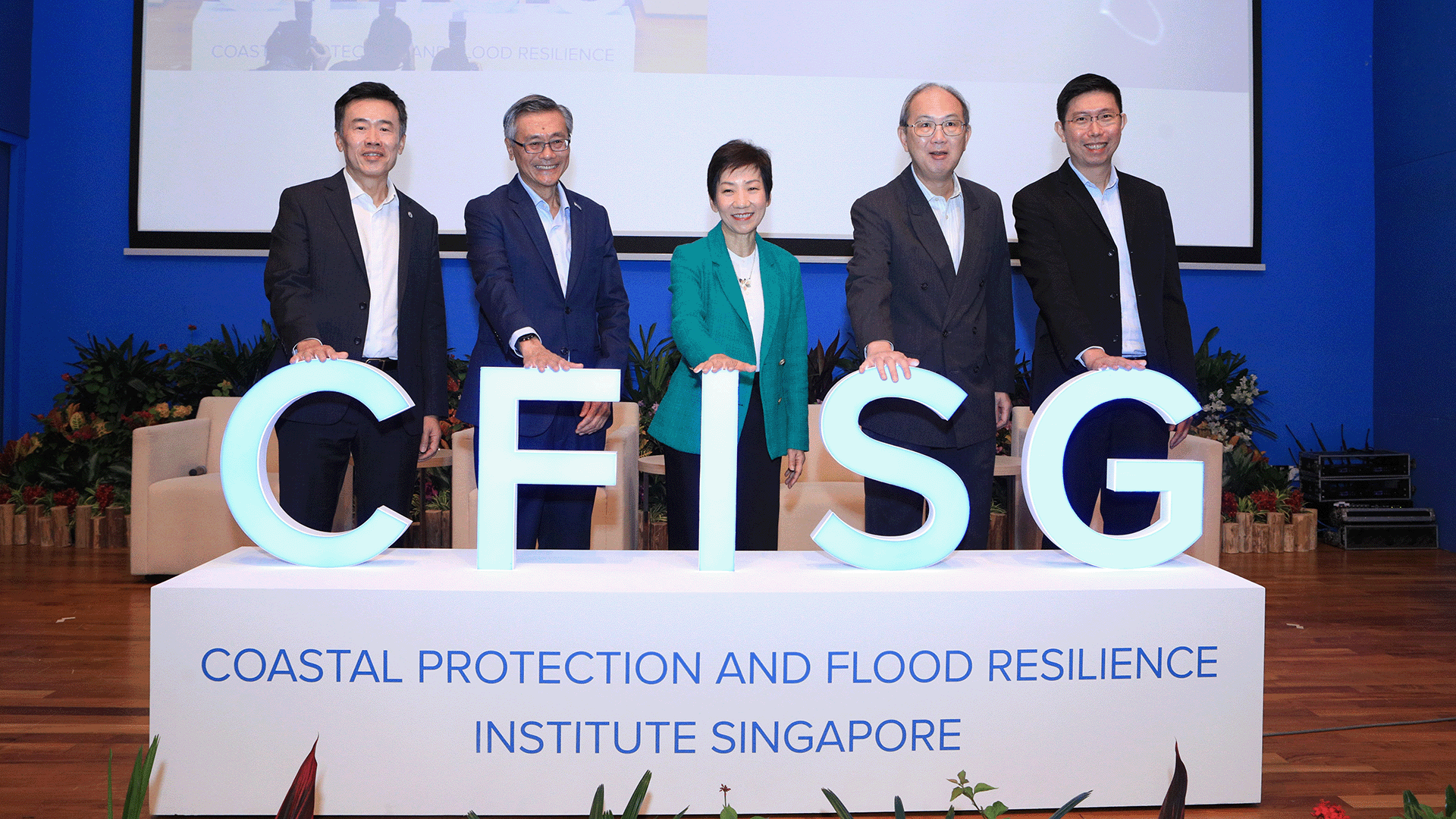
The Coastal Protection and Flood Resilience Institute, a new Centre of Excellence (CoE) dedicated to research into coastal protection and flood resilience, has been formally launched at a ceremony held at NUS.
To be known as ‘CFI Singapore’, the multi-institutional and interdisciplinary institute will be led by Professor Richard Liew, Head of the Department of Civil and Environmental Engineering at CDE, and will draw on faculty expertise and resources from the College, elsewhere at NUS, in addition to other Singapore universities and institutions.
Hosted at NUS, CFI Singapore is supported by funds from the Public Utilities Board (PUB) as a key pillar of its S$125 million Coastal Protection and Flood Management Research Programme.
The launch ceremony for the institute was held at NUS on September 7, attended by Guest of Honour, Minister for Sustainability and the Environment Grace Fu, along with over 200 guests including researchers, students, industry professionals and representatives of partner institutions.
Speaking during a panel discussion at the launch, Ms Fu said when it came to the effects of climate change it was important for Singapore to “look very far ahead and take action today.”
With proper planning, she said, solutions to these challenges would not only protect lives and livelihoods, but could also create new value for Singapore – both in terms of new uses for land, and in terms of skills and talent.
The new institute aims to be a leading global research and education institute for tackling the challenges posed by rising sea levels and climate change, building long-term capability and a pipeline of professionals in this vital area.
Driven by climate change, mean sea levels around Singapore are projected to rise by up to one metre by the year 2100 – a significant threat to a nation where almost a third of its land is less than five metres above sea level.
At the same time, extreme storms and heavy rainfall are expected to become more frequent, raising the risks of flooding.
‘Crown jewel’ of research
Alongside leading faculty from NUS, CFI Singapore will bring together experts from partner institutions including NTU, SUTD, SIT and A*STAR. The institute will also collaborate with research institutes and entities, both in Singapore and overseas, as well as key national and international industry players.
Opening the ceremony to launch the institute, NUS President Professor Tan Eng Chye said CFI Singapore would work to strengthen connections with industry partners and international institutes, and engage in dialogue with experts in other cities and regions on what measures they are taking to tackle the impacts of climate change.
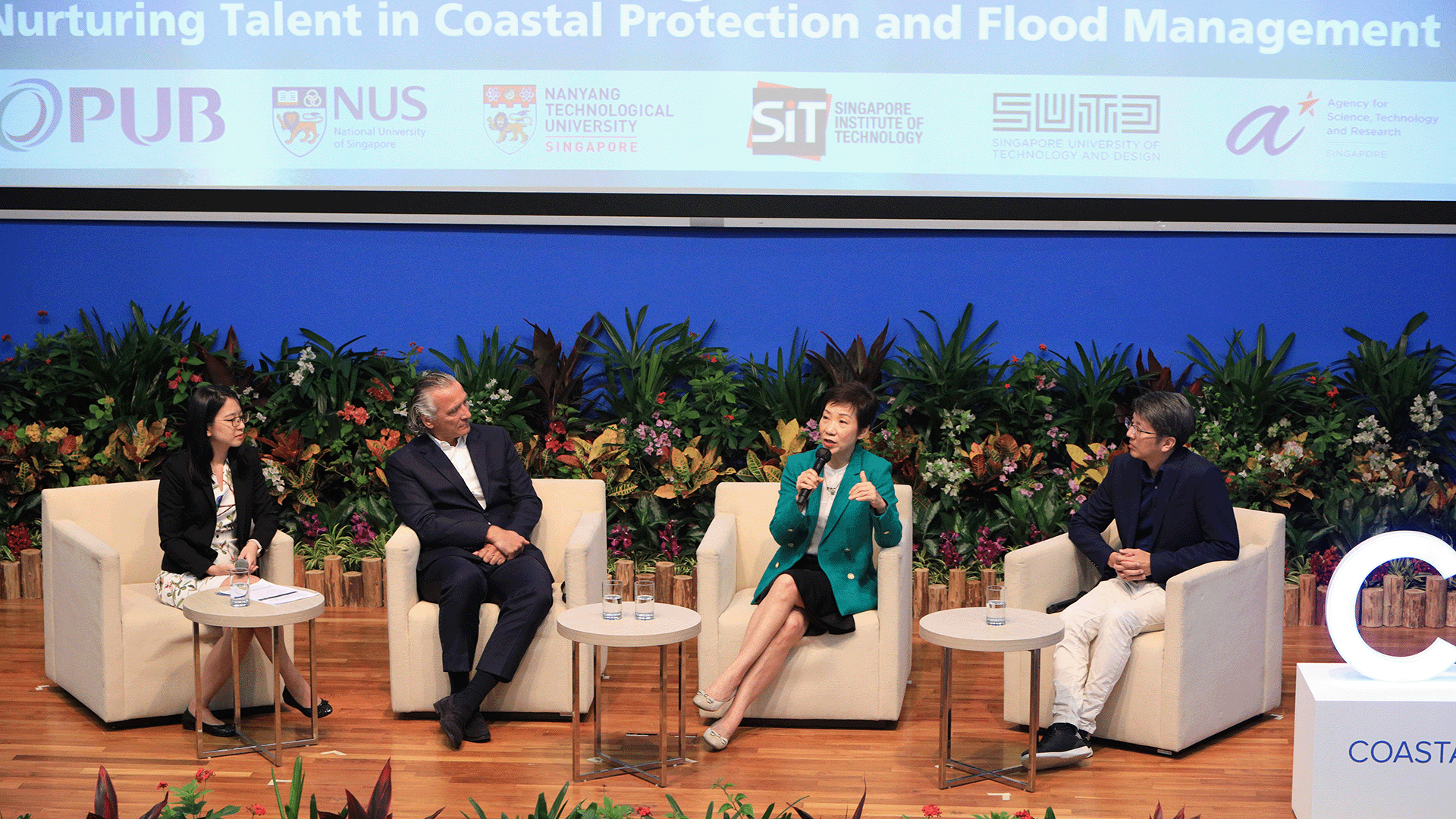
“This is an opportunity for Singapore to learn from, as well as to contribute, to the global knowledge and experience base,” he said. “CFI Singapore will be part of a network of countries and organisations working on coastal protection and flood resilience.”
Prof Tan added that with strong support from the PUB and other institutions, he was “confident that CFI Singapore will contribute to continuing the Singapore story of overcoming challenges and constraints, and building a stronger, more resilient and sustainable Singapore.”
Watch the CFI Singapore launch ceremony (starts at approx. 18:00):
Also speaking at the launch, PUB Chief Executive Mr Goh Si Hou said the institute marked “a new milestone in Singapore’s journey in coastal protection and flood resilience”.
“Singapore faces unique challenges,” he said, “we are not only a low-lying island, but land-scarce, highly urbanised and densely-populated. Every stretch of our coastlines is highly valued for housing, industry or recreation.
CFI-Singapore, Mr Goh said, represented the “crown jewel” of research efforts to meet the challenges that climate change poses to Singapore’s future.
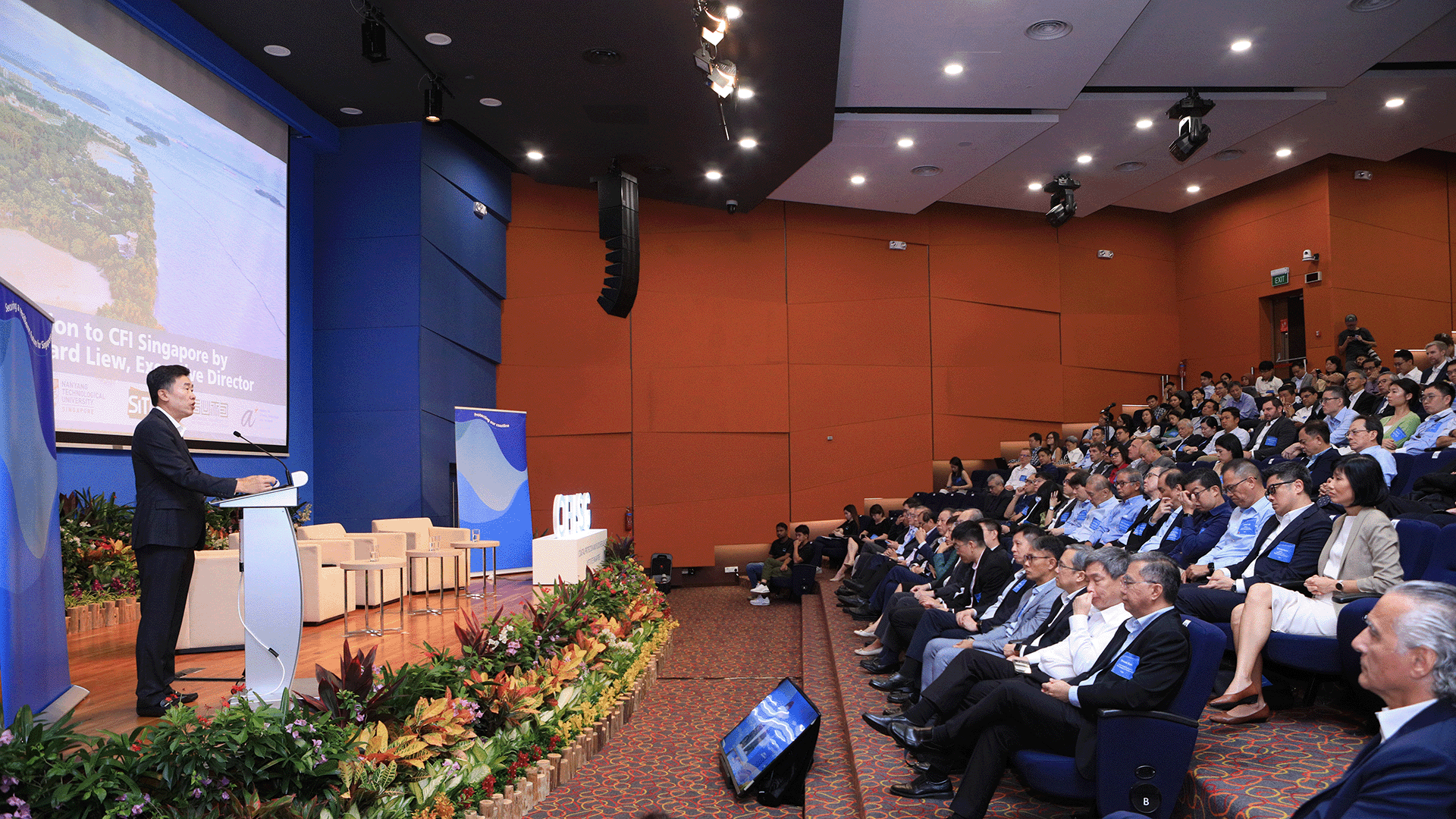
‘Collaborative ecosystem’
Professor Richard Liew (Head, Department of Civil and Environmental Engineering at CDE), who has been named as Executive Director of CFI Singapore, told the ceremony that the institute would develop solutions that are not only practical and sustainable, but also resonate with the needs of the relevant local communities.
“By actively engaging with our industry partners and local communities, we can develop strategies tailored to the unique challenges of each coastal region,” he said.
He added: “We are committed to fostering a collaborative ecosystem with universities, research institutes, both locally and internationally, as well as industry partners.”
Prof Liew said that CFI Singapore had commenced the first phase of research projects, with a total of nine projects approved by the Centre’s Executive Committee.
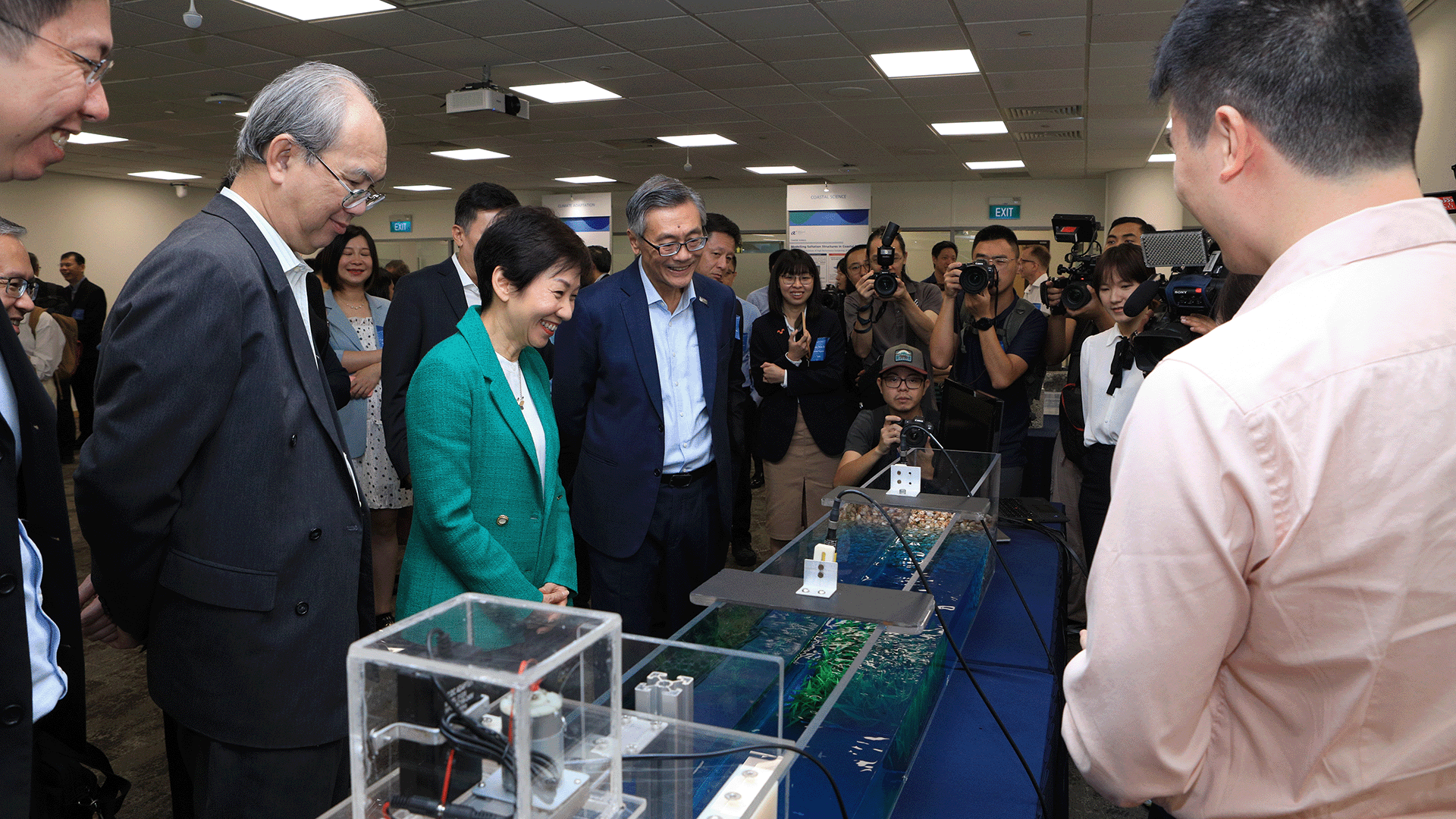
These projects cover four key areas – coastal science research; monitoring, prediction and digitalisation of the coastal environment; innovative engineering solutions; and integrated nature-based solutions. Each project will involve an expert as the principal investigator and is supported by collaborators drawn from local and foreign universities, as well as industry partners.
Nature-based solutions
One of the projects that CFI Singapore has embarked on is the development of nature-based solutions, employing an integrated meta-hydro-ecological approach to protect Singapore’s coastlines.
This project, jointly led by Assistant Professor Gary Lei (NUS Department of Civil and Environmental Engineering) and colleagues from elsewhere in NUS, will study how different combinations of nature-based and engineering solutions work together to protect coastlines and map out potential integration sites around Singapore for hybrid solutions to be implemented.
The researchers aim to develop innovative hybrid coastal protection solutions, such as perched beaches with seagrasses and mangroves integrated with rock revetments, and test them for effectiveness in coastal protection, assessing both the ecological and social benefits.
“Mangroves and seagrasses are important coastal species in Singapore and can play a key role in coastal defences,” said Asst Prof Lei.
“Overall the aim of our research is to build a universal model that tells us clearly how much this vegetation can help to protect the coast in all conditions - with different waves, currents, flows etcetera - and how these interact with different vegetation species.”
| About CFI Singapore
A key pillar of the PUB’s S$125 million Coastal Protection and Flood Management Research Programme (CFRP) the Coastal Protection and Flood Resilience Institute (CFI Singapore) will be hosted at NUS. The institute has been founded as multi-institutional and inter-disciplinary research centre, bringing together the strength, resources and expertise of local universities, research institutes and industry. CFI Singapore’s management includes: Executive Director: Professor Richard Liew (Head, Dept of Civil and Environmental Engineering, CDE) As Singapore’s first Centre of Excellence for coastal protection and flood management research, the objectives of CFI Singapore include:
“CFI-Singapore was founded with a vision to be a leading global research institute… Partnering with renowned institutions is helping us consolidate expertise across the nation and beyond. Greater collaboration means amplifying our collective expertise across disciplines and driving innovative solutions in coastal protection and flood resilience.” “Adapting to rising sea levels is a complex endeavour that requires long-term planning. To meet these challenges, we need to rally key stakeholders... CFI Singapore will foster research and collaboration across academia and industry and develop the local talents we need to address this challenge. Together we can forge a path towards greater coastal and flood resilience.” Find out more at the CFI Singapore website: https://cde.nus.edu.sg/cfisg/ |



